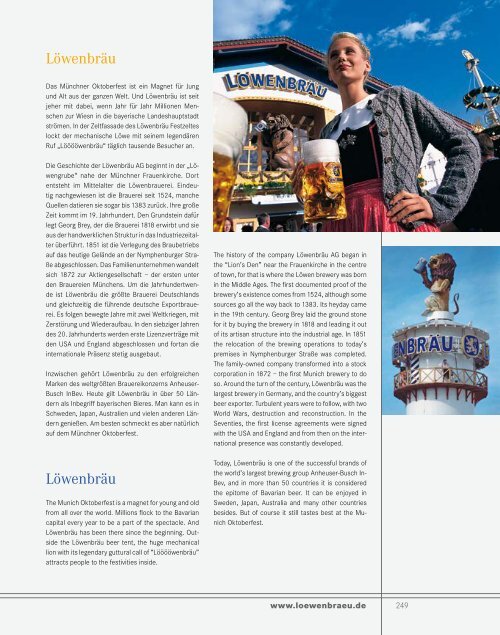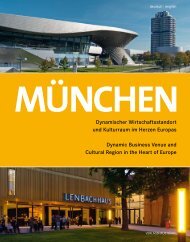München - Dynamischer Wirtschaftsstandort und Kulturraum im Herzen Europas
Create successful ePaper yourself
Turn your PDF publications into a flip-book with our unique Google optimized e-Paper software.
Löwenbräu<br />
Das Münchner Oktoberfest ist ein Magnet für Jung<br />
<strong>und</strong> Alt aus der ganzen Welt. Und Löwenbräu ist seit<br />
jeher mit dabei, wenn Jahr für Jahr Millionen Menschen<br />
zur Wiesn in die bayerische Landeshauptstadt<br />
strömen. In der Zeltfassade des Löwenbräu Festzeltes<br />
lockt der mechanische Löwe mit seinem legendären<br />
Ruf „Lööööwenbräu“ täglich tausende Besucher an.<br />
Die Geschichte der Löwenbräu AG beginnt in der „Löwengrube“<br />
nahe der Münchner Frauenkirche. Dort<br />
entsteht <strong>im</strong> Mittelalter die Löwenbrauerei. Eindeutig<br />
nachgewiesen ist die Brauerei seit 1524, manche<br />
Quellen datieren sie sogar bis 1383 zurück. Ihre große<br />
Zeit kommt <strong>im</strong> 19. Jahrh<strong>und</strong>ert. Den Gr<strong>und</strong>stein dafür<br />
legt Georg Brey, der die Brauerei 1818 erwirbt <strong>und</strong> sie<br />
aus der handwerklichen Struktur in das Industriezeitalter<br />
überführt. 1851 ist die Verlegung des Braubetriebs<br />
auf das heutige Gelände an der Nymphenburger Straße<br />
abgeschlossen. Das Familienunternehmen wandelt<br />
sich 1872 zur Aktiengesellschaft – der ersten unter<br />
den Brauereien <strong>München</strong>s. Um die Jahrh<strong>und</strong>ertwende<br />
ist Löwenbräu die größte Brauerei Deutschlands<br />
<strong>und</strong> gleichzeitig die führende deutsche Exportbrauerei.<br />
Es folgen bewegte Jahre mit zwei Weltkriegen, mit<br />
Zerstörung <strong>und</strong> Wiederaufbau. In den siebziger Jahren<br />
des 20. Jahrh<strong>und</strong>erts werden erste Lizenzverträge mit<br />
den USA <strong>und</strong> England abgeschlossen <strong>und</strong> fortan die<br />
internationale Präsenz stetig ausgebaut.<br />
Inzwischen gehört Löwenbräu zu den erfolgreichen<br />
Marken des weltgrößten Brauereikonzerns Anheuser-<br />
Busch InBev. Heute gilt Löwenbräu in über 50 Ländern<br />
als Inbegriff bayerischen Bieres. Man kann es in<br />
Schweden, Japan, Australien <strong>und</strong> vielen anderen Ländern<br />
genießen. Am besten schmeckt es aber natürlich<br />
auf dem Münchner Oktoberfest.<br />
Löwenbräu<br />
The Munich Oktoberfest is a magnet for young and old<br />
from all over the world. Millions flock to the Bavarian<br />
capital every year to be a part of the spectacle. And<br />
Löwenbräu has been there since the beginning. Outside<br />
the Löwenbräu beer tent, the huge mechanical<br />
lion with its legendary guttural call of “Lööööwenbräu”<br />
attracts people to the festivities inside.<br />
The history of the company Löwenbräu AG began in<br />
the “Lion’s Den” near the Frauenkirche in the centre<br />
of town, for that is where the Löwen brewery was born<br />
in the Middle Ages. The first documented proof of the<br />
brewery’s existence comes from 1524, although some<br />
sources go all the way back to 1383. Its heyday came<br />
in the 19th century. Georg Brey laid the gro<strong>und</strong> stone<br />
for it by buying the brewery in 1818 and leading it out<br />
of its artisan structure into the industrial age. In 1851<br />
the relocation of the brewing operations to today’s<br />
premises in Nymphenburger Straße was completed.<br />
The family-owned company transformed into a stock<br />
corporation in 1872 – the first Munich brewery to do<br />
so. Aro<strong>und</strong> the turn of the century, Löwenbräu was the<br />
largest brewery in Germany, and the country’s biggest<br />
beer exporter. Turbulent years were to follow, with two<br />
World Wars, destruction and reconstruction. In the<br />
Seventies, the first license agreements were signed<br />
with the USA and England and from then on the international<br />
presence was constantly developed.<br />
Today, Löwenbräu is one of the successful brands of<br />
the world’s largest brewing group Anheuser-Busch In-<br />
Bev, and in more than 50 countries it is considered<br />
the epitome of Bavarian beer. It can be enjoyed in<br />
Sweden, Japan, Australia and many other countries<br />
besides. But of course it still tastes best at the Munich<br />
Oktoberfest.<br />
www.loewenbraeu.de 249




